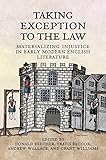Taking Exception to the Law : Materializing Injustice in Early Modern English Literature / ed. by Donald Beecher, Grant Williams, Andrew Wallace, Travis DeCook.
Material type: TextPublisher: Toronto : University of Toronto Press, [2015]Copyright date: ©2015Description: 1 online resource (288 p.) : 6 b&w illustrationsContent type:
TextPublisher: Toronto : University of Toronto Press, [2015]Copyright date: ©2015Description: 1 online resource (288 p.) : 6 b&w illustrationsContent type: - 9781442690226
- 820.9/3554 23
- PR428.L37 T35 2015eb
- online - DeGruyter
| Item type | Current library | Call number | URL | Status | Notes | Barcode | |
|---|---|---|---|---|---|---|---|
 eBook
eBook
|
Biblioteca "Angelicum" Pont. Univ. S.Tommaso d'Aquino Nuvola online | online - DeGruyter (Browse shelf(Opens below)) | Online access | Not for loan (Accesso limitato) | Accesso per gli utenti autorizzati / Access for authorized users | (dgr)9781442690226 |
Frontmatter -- Contents -- Illustrations -- Acknowledgments -- 1. Law and the Production of Literature: An Introductory Perspective -- 2. Paper Justice, Parchment Justice: Shakespeare, Hamlet, and the Life of Legal Documents -- 3. Conditional Promises and Legal Instruments in The Merchant of Venice -- 4. The “Snared Subject” and the General Pardon Statute in Late Elizabethan Coterie Literature -- 5. The Prison Diaries of Archbishop Laud -- 6. Criminal Biography in Early Modern News Pamphlets -- 7. Two-Sided Legal Narratives: Slander, Evidence, Proof, and Turnarounds in Much Ado About Nothing -- 8. No Boy Left Behind: Education and Distributive Justice in Early Modern England -- 9. Warding off Injustice in Book Five of The Faerie Queene -- 10. Torture and the Tyrant’s Injustice from Foxe to King Lear -- 11. The Literatures of Toleration and Civil Religion in Post-Revolutionary England -- 12. Obnoxious Satan: Milton, Neo-Roman Justice, and the Burden of Grace -- Contributors -- Index
restricted access online access with authorization star
http://purl.org/coar/access_right/c_16ec
Taking Exception to the Law explores how a range of early modern English writings responded to injustices perpetrated by legal procedures, discourses, and institutions. From canonical poems and plays to crime pamphlets and educational treatises, the essays engage with the relevance and wide appeal of legal questions in order to understand how literature operated in the early modern period.Justice in its many forms – legal, poetic, divine, natural, and customary – is examined through insightful and innovative analyses of a number of texts, including The Merchant of Venice, The Faerie Queene, and Paradise Lost. A major contribution to the growing field of law and literature, this collection offers cultural contexts, interpretive insights, and formal implications for the entire field of English Renaissance culture.
Mode of access: Internet via World Wide Web.
In English.
Description based on online resource; title from PDF title page (publisher's Web site, viewed 25. Jun 2024)


